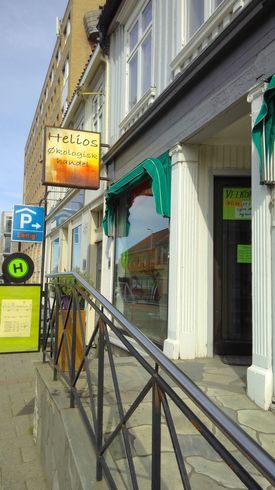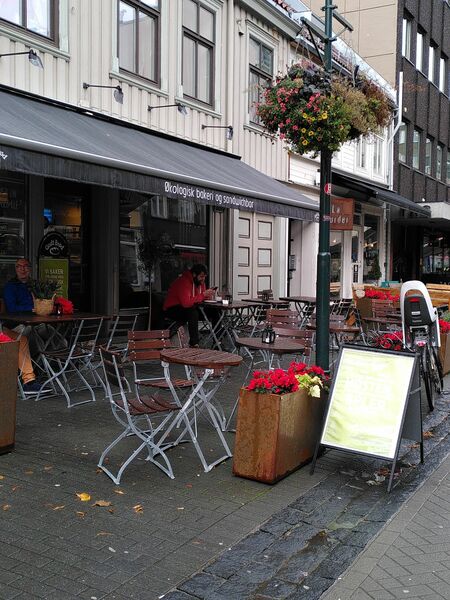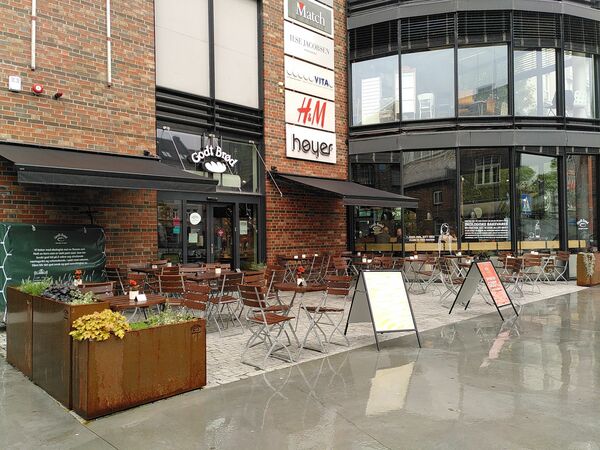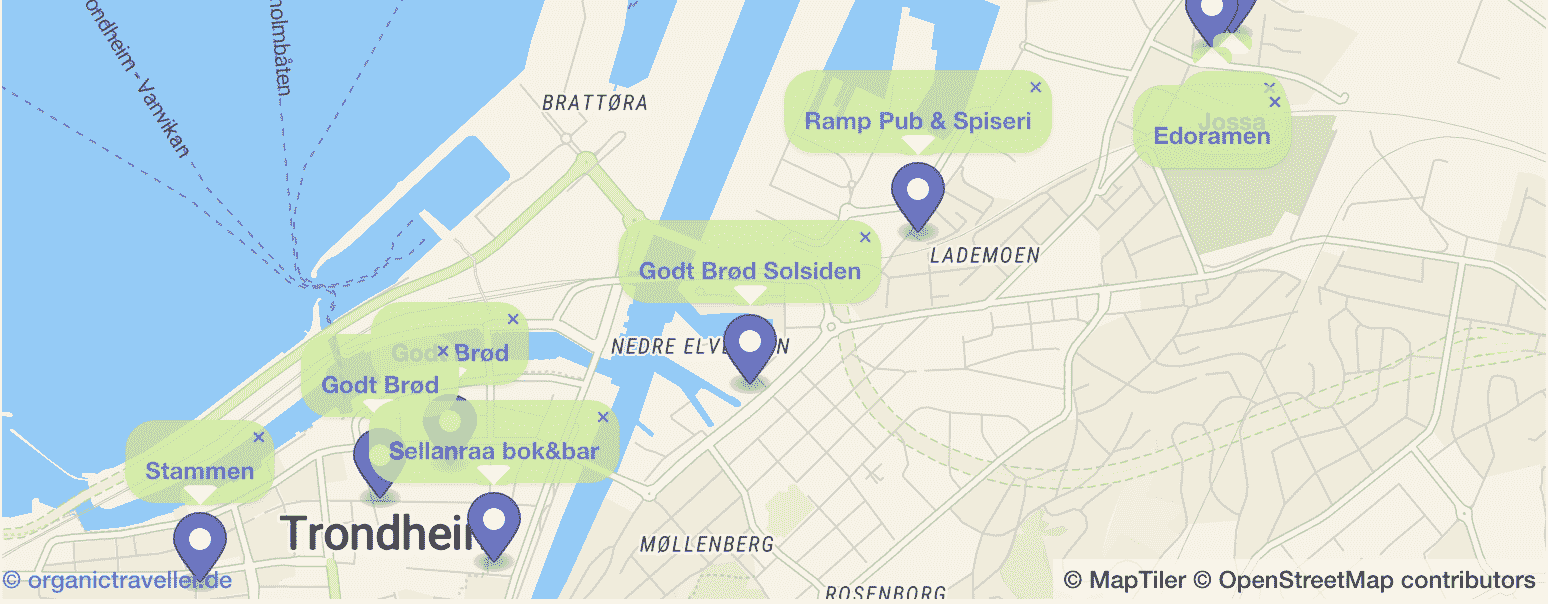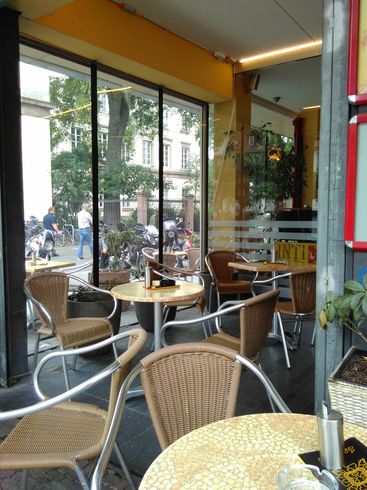Munich: Organic coffee and tea houses
To find a self-respecting restaurant or supermarket snack bar not equipped with a restaurant-size Italian espresso machine can be difficult, and even the tiniest organic corner shop will try to offer you ubiquituous Italian-style coffee drinks. Likewise you can have organic tea bag teas and infusions of usually decent quality. But for the modern nomad on the job, the afternoon chat with friends or the traveller in search of a undisturbed place for a break or observations, the dedicated coffee or tea house is a far more appropriate place to spent hours. Common for all the places listed here that they are closed in the evening – usually around 6pm, some keep open until 8pm. Note that weekend opening hours may be even more restricted.
- Viennese-style coffee houses
- Oriental-style coffee
- Italian style bars
- (Almost) fully organic places
- Shabby chic and homely places
- Self-service coffee house and deli bars
- Mingle with the working crowd
- Tea houses
- More to try
- Closed
Viennese-style coffee houses
The headline is misleading – even if an increasing number of cafes see themselves in the tradition of Viennese coffee houses when it comes to the stuccoed interior, the dark wooden furniture, a selection of daily newspapers as well as the menu, they will usually serve Italian-style coffee drinks. The perfect place for breakfast and a coffee break at any time of the day, you will also be served lunch and snacks throughout the day. Expect however to order more of the deliciously handcrafted cakes than you initially intended to.
To my knowledge the only one left since the end of 2020 and my absolute favourite is the restored Cafe Reichshof in Haidhausen, covered in detail in my ice-cream post.
Oriental-style coffee
Since Iunu stopped serving Turkish mocca the only place offering responsibly sourced oriental-style coffee in Haidhausen is Saladins Souk with its rather irrational opening hours. If it is closed you may move next door to Erbils vegan Turkish eatery.
In autumn 2021 I noticed to my delight that these aren't the only mocca places anymore: The Icedate ice-cream parlour in Maxvorstadt started serving organic coffee, although the price tag of 2.40 EUR the mocca is rather stiff.
Italian style bars
Pop in, have a coffee, a chat, a sweet, and pop out again – the Italian bar is the hotspot of a neighbourhood. To my deepest regret its Bavarian incarnation is no more (landlord cancelled contract with the coffee roastery), but in the middle of humming Viktualienmarkt market North of the crossing Reichenbachstraße/Frauenstraße there's Kaffeerösterei Viktualienmarkt, a vibrant market booth with bar tables under a roof. So even if the weather is bad and you're outside there's no reason to give up plans for an Italian style coffee drink made with sustainably sourced (though not organically certified), locally roasted coffee. The milk is organic and comes from traditionally working mountain farms in the Berchtesgadener Land district, packaged by the co-operatively driven Berchtesgadener Land dairy which, in 2017, banned the use of glyphosate for all its farmers, not only the organic ones.
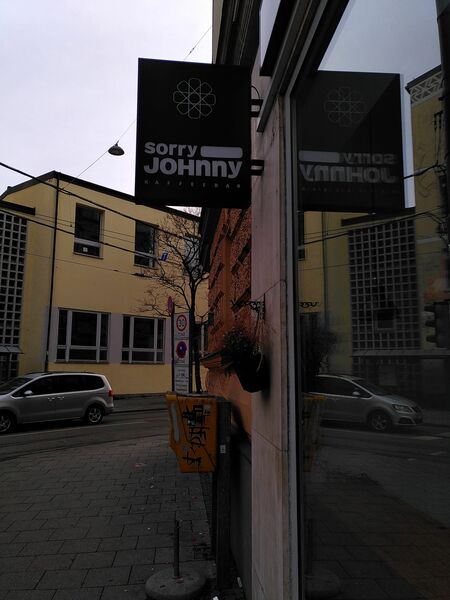
If you prefer your coffee with biodynamic (Demeter) milk head for the Sorry Johnny coffee bar in Haidhausen, conveniently located at the Wörthstraße tram stop. The place has quite unusual opening hours: closed on Tuesdays and Wednesdays, and open during the early evening on Fridays and Saturdays. The bar replaced a vegan clean-eating spot in autumn 2021 which, for a while, prepared my favourite oat-based latte – a coffee preparation that's still available here.
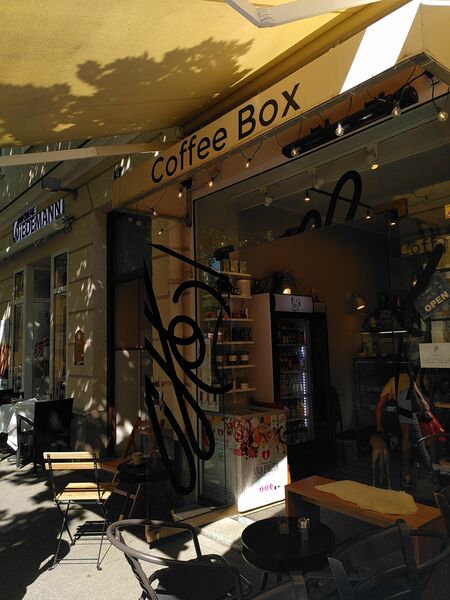
Without the heavy car traffic the area between Max-Weber- and Wiener Platz could be a lovely urban hideaway, with singing tram tracks, an underground station (exhibiting Munich's first horse tram), pleasant shops, cafes and nearby parks. To escape from the agressive passive motorised mobility along Innere Wiener Straße jump into quiet Steinstraße and take a breath at the tiny Coffee Box cafe. Although some of their coffee is roasted by Merchant & Friends in Glonn, none of the beans served here are organic. The milk, however, is organic, as is the ginger and pomegranate juices used in some drinks. For a refreshment in the summer heat have an organic, vegan popsicle.
If you want to mingle with people from the neighbourhood in Haidhausen head for the Italian-style Fortuna Cafébar for a snack or a short coffee break. The milk is organic (though not the oat drink), and if you are in the mood for a "würstel" snack, the Frankfurters are organic, too. More organic ingredients may be hidden in the Italian-style sandwiches. Since the crossroad got bicycle parking on all four corners it's also become a relaxed place to watch people.
Not certified organic, but responsibly sourced coffee beans grown with respect for nature by small scale farmers – the coffee roasted at the Alrighty coffee bar in the newly developed, trending Werksviertel will nevertheless give you the comforting feel of doing something right. To find the place leave Ostbahnhof station through the Friedensstaße exit to enjoy a speciality coffee preferably in the sun.
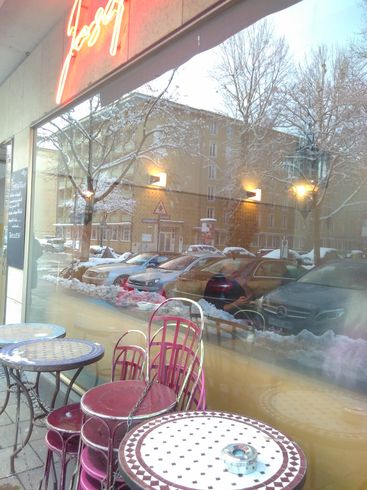
(Almost) fully organic
If all you want is a place where you do not have to fine-read the menu to pick out the organic items your options are limited to the afore mentioned Café Reichshof, near tram stop "Wörthstraße") – and to Café Josefina in the legendary neighbourhood of Schwabing with its bohemian past, a few steps from tube stop Josephsplatz. A cosy day cafe serving Italian-style coffee drinks made with real milk or a number of plant-based alternatives it's not only worth a coffee but also a lunch break. Although nearly all ingredients are organic there are a few exceptions when it comes to the cold cuts used in Italian-style sandwiches. As early as half past seven the place starts serving both, vegan, vegetarian, and omnivore breakfast on weekdays, and since it is quite small it's advisable to reserve a table if you plan to step by on a weekend.
For a fully organic breakfast or coffee near Münchner Freiheit head for the small artisanal (and fully organic) Brotraum bakery happily catering for early birds. The breakfast menu is simple – but you can order additional items like eggs and cream cheese on top or ask for a freshly prepared sandwich or roll of your choice. Don't forget to bring your own bags and containers when you come here to buy bread, rolls or lunch items for take away – the owner is inclined to support your zero waste efforts.
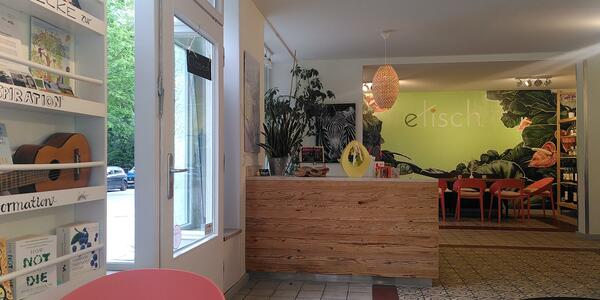
Shabby chic and homely places
The Westend has lost a lot of organic or partially organic places after or during the covid 19 pandemic, so I am happy to see a location with a long history of being organic to be revived in this spirit: The new (in 2024) vegan cafe Etisch at Gollierplatz opened in lieu of one of those friendly, crammed owner-run organic cornershops, Nico's.
Its chef (as of April 2024) was in the process of getting a organic certificate for his kitchen, and the owner, Aylin, was planning to obtain a certificate, too. For the time being, many ingredients are already organic, but not all. The pear-chocolate cake I had was soft and far too fast eaten. In addition I had a very decent cappuccino with organic oat milk (the default however is a conventional brand with aggressive marketing). Had I been hungry I'd have given the Turkish-style börek a try. Etisch – the name is a pun of the German words for "ethical" and "table" ("Tisch") – also offers a tempting lunch menu. In addition you can shop for body care, olive oil, the non-alcoholic gin substitute of the otherwise organic distillery "Duke" in Aschheim and other sustainable (though not necessarily organically certified) products.
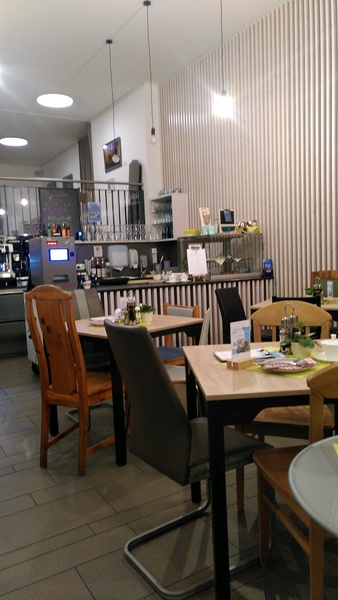
The neighbourhood cafe JoMa (short for "John and Mary") at Carl-Amery-Platz in the Au is one of the few places where you can get predominantly organic lunch, snacks and drinks at a price also affordable for smaller budgets once in a while. The place is run by a registered social association founded by the local Lutherian and Catholic parishes and receives grants from the city of Munich. You will meet both, payed employees and volunteers, including people with a handicap. Lunch is served as a daily changing buffet made from predominantly local and/or organic produce from 11 am to 3 pm. The cake is home-made, and the coffee made with a proper steam machine. Unfortunately the place is closed during the weekend.
On Tuesday evenings (when the cafe itself is closed), there are Pilates classes for which you have to sign up in advance and bring your own mat. The place hosts other events with a social and/or spiritual focus, too.
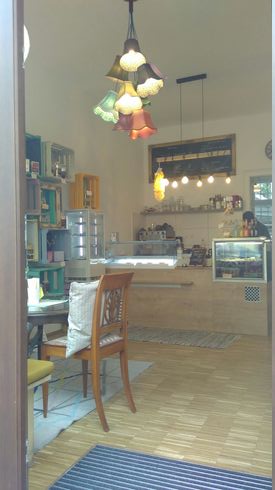
A small cafe of old, run as a social enterprise just a five minutes walk away from Rosenheimer Platz, Cafe Plaisir moved to a bigger and lighter venue in 2018 – and stopped using organic ingredients for their home-made ice-cream, chocolates, cakes and cookies. Still, tea and coffee drinks and a few more items are marked on the menu with a little heart denoting organic, and eggs – where marked – come from organic farms raising both, the hens and their cockerel brothers. Be patient and kind if the serving personnel does not respond immediately – the shop is a social enterprise run by longterm-unemployed persons.
Not far from Ostbahnhof station Kosy*s cafe promises to be "your second living room". As long as you have some tolerance towards cake stands filled with kitschy sweets guaranteed free from natural colourings and a decidedly vintage feel you can have an organic tea or soft drink, a coffee drink made with organic milk, organic eggs and cereals for breakfast or a hearty lunch often entirely made from organic ingredients in a leisurely atmosphere. The good thing is that organic ingredients aren't shamefully hidden – when it's organic they'll make it transparent on the menu. The bad news: their homemade cakes unfortunately are not organic, not even the eggs.
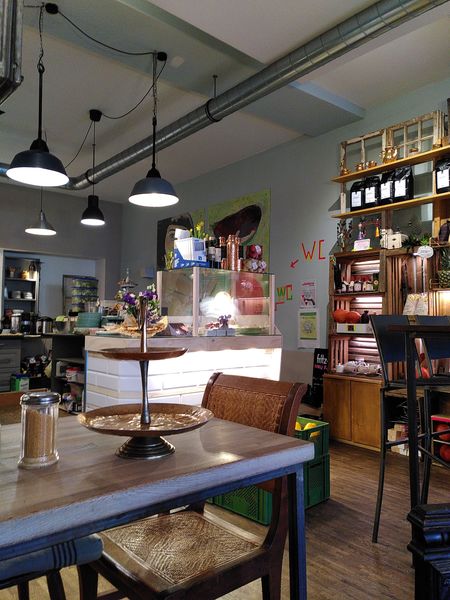
A few steps away, directly located at Orleansplatz cafe Iunu is a perfect place to meet a friend for a chat or to have a recreational coffee break including a chat with the friendly owner. Some of the coffee, the milk, the tea and a few staples used in the daily changing vegetarian and ayurvedic-inspired lunch set menu like agave syrup, rice and vegetable yogurt alternatives are organic, but unfortunately usually not the veges. The place was my joker for the best Turkish mocca in town, but unfortunately it is no longer being served due to marginal demand. With a small but carefully chosen (though not necessarily organic) range of delicatessen Iunu will also save you when in need for an unplanned last minute gift. On Saturdays the cafe is often unexpectedly closed due to arrangements, so check in advance.
Another cosy living room dubbed Zimtzicke is tucked away in comparatively quiet Elsässer Straße, only a five minutes walk from Ostbahnhof. All their teas, coffees, the milk and eggs are organic. Their lunch dishes, although mainly not organic, are tasty. However, when I enquired about the ingredients of the individual dishes on the menu, the staff wasn't able to tell whether they contained organic ingredients. The tiny place smells lovely of home-make cakes, some of them vegan. A perfect location to warm up after a winter walk in the city, and a pleasant retreat to welcome spring or to enjoy a summer day in the city on a table in front of it.
Most cafes in this area in the neighbourhood of Haidhausen, among locals also known as the Franzosenviertel ("French quarter") for its French street names, draw on European kitchen and coffee traditions. The Café Miu at Pariser Platz is a notable exception when it comes to food: The signature dish are Banh Mi, healthy Vietnamese sandwiches made from baguettes for all, including vegans and meat lovers. The place is clearly an all-day breakfast iand coffee place, serving organic eggs and international breakfast varieties until 3 pm. The Italian-style coffee drinks come with organic milk, and the soft drinks are also organic. Until the local Emilo coffee roasters had to give up (a real estate developer rendered their roasting equipment unusable) the place also served this coffee. The cafe is driven by the family behind the Fei scho eatery: They exchanged the location of their Haidhausen-based branch with the place which became Café Miu.
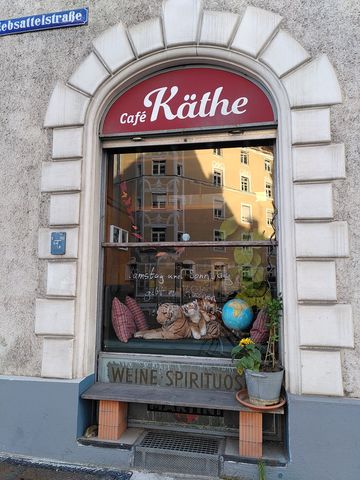
Another option to mingle with natives is a homely shabby chic neighbourhood cafe cum gallery in the neighbourhood of Au, on the Eastern shore of river Isar near Deutsches Theater. The audience of Café Käthe is mixed, coffee, milk, tea, rolls and cakes as well as most of the softdrinks are organic. They don't serve hot food, but you can have breakfast, sandwiches, cereals, salads and - of course – cake all day. Many but not all ingredients are organic, so ask if you care but be prepared that the service personnel isn't prepared to answer on the spot.
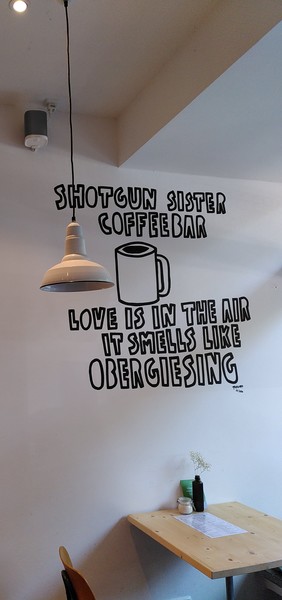
A crowded neighbourhood coffee bar in Obergiesing, Shotgun Sister allows you to meet people from the former working class borough which has been popular among both, students and families alike. All food including the cakes are home-made, with organic fruit and veges, often from local biodynamic agriculture. The cakes are fully organic. If you cannot spot the place at once watch out for the branch of the organic Hofpfisterei bakery chain which is located next to it, a five minutes walk from Giesing station. If you like splash out a coffee on an unknown – as the sister participates in the Hey campaign for fellow citizens in need. Needless to say that vegan and gluten-free options are readily available.
Big enough to almost guarantee a free seat for the visitor-by-chance is Cafe Katzentempel in the Maxvorstadt university quarter. You must however not suffer from a cat allergy as this rather special vegan place is inhabitated by six cats, and the once nice wallpaper on the wall with the scratch pole facing the entrance has already become rather shabby. Most of the softdrinks are organic as are all soy products and the cow milk (on request used for non-vegan coffee and tea-based drinks). The place offers an impressive range of organic nuts and grain milks to be ordered for your latte. The food and home-made cakes may include additional organic ingredients, although they aren't generally organic, just of local origin if possible. Students and apprentices are entitled special prices Tuesday through Friday, and free wifi is available. Depending on your table you may find the slightly aggressive sales presentation of the Katzentempel brand t-shirts disturbing – overall a place to either love or detest.
Further along Türkenstraße you'll find Mr. Ben – a small coffee cum snacks place offering (herbal) tea and soft drinks in organic quality. Unfortunately neither the coffee artisanally roasted in the neighbourhood of Giesing nor the milk and oat milk are organic. There's a small selection of Italian-style piadina sandwiches and freshly home-made cake which occasionally may contain organic ingredients. The croissants used to come from an organic bakery a longer bicycle ride out of town but they were sold out (just like the veggie piadina) when I was there. Orders should be placed at the bar, but you will be served, and return to the bar for payment, preferably (and if the sum is smaller than ten euros only) in cash.
If you prefer strictly vegan places for a coffee break try Siggis which I reviewed here.
Self-service coffee house and deli bars
For the no-frills coffee with WLAN or on the go a number of nation-wide operating self-service coffee house chains serve Italian and American-style organic coffee often with organic milk and some more organic items like tea, soft drinks or fruit and nut bars. The market in Munich is quite volatile: The once dominating franchise San Francisco Coffee Company filed for bankruptcy during the covid-19 pandemics and does no longer have stores in Munich. Black Bean never expanded and survived, and Coffee Fellows is now ubiquitous, serving coffee at (among others) fuel and train stations.
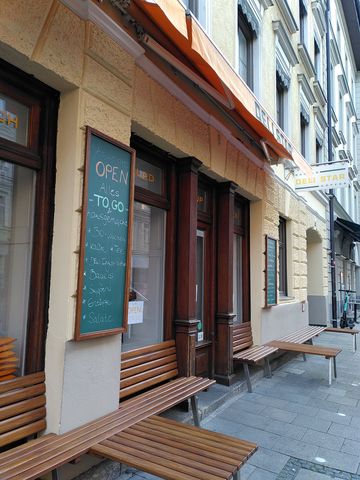
My favourite in this category is a small organically certified Munich-based chain: Deli Star brings the spirit of New York-style deli and coffee bars to town, but with a strong focus on the environment: No plastics here, all take away stews and salads come in returnable glass jars, and the coffee on the go in a Recup deposit cup if you don't bring your own. Not every ingredient in their bagels, sandwiches, stews and salads is organic, but all regular organic items are clearly marked BIO on the menu: the cakes (though not the muffins and brownies), most meat products, yogurt, Lemonaid and Adelholzener fruit and soft drinks. Other ingredients like veges and cheese may or may not be organic. The coffee isn't organic, but the milk comes in huge reusable containers from a local organic farm. In general they use a lot of products grown and produced in the region and/or from small-scale manufacturers. Both branches are located in students' hotspots in Maxvorstadt: near the University and at the entrance to the Englischer Garten park.
Mingle with the working crowd
Campus canteens and coffee bars frequented by those working nearby are excellent places to get in contact with locals – with the disadvantage of opening hours following office hours.
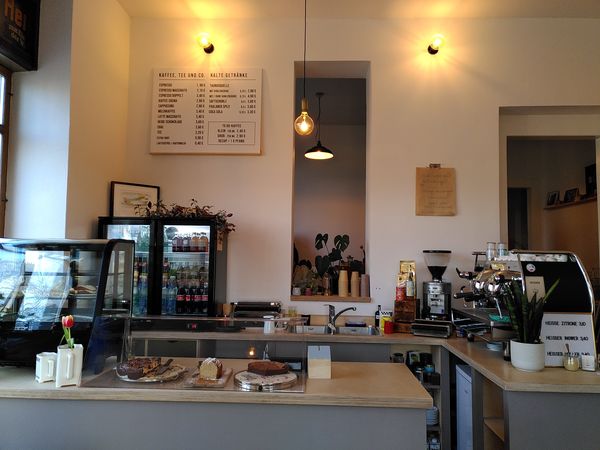
On the eastern side of the railway tracks of Ostbahnhof train station, a few minutes north of the newly developed Werksviertel you'll find day cafe Louka, a friendly no-frills place mainly catering for the office workers and craftspersons working nearby. What you get here: coffee, home-made cakes and sandwiches, a daily changing soup and main course, often vegetarian. If you want to taste simple German everyday standards like Kässpätzle and Schupfnudeln, or the Russischer Zupfkuchen ("Russian pluck cake") cheesecake, this is the place. Not everything is organic here, but both, the coffee, the milk and the plant-based drinks, the eggs, often the veges and the meat are.
Steinhausen is most certainly not a neighbourhood you will have on your travel agenda, but if you come to the Berg am Laim urban train, bus and tram stop the coffee bar on the ground floor of the Süddeutsche Zeitung publishing house is nearby and open to the public. It offers organic organic soft drinks and sweet pastries at very competitive prices. The rolls used for sandwiches are also organic, but the new (as of June 2024) caterer "Kochmanufaktur" stopped using organic milk for coffee drinks. At times the oat drink is organic, and you can usually spot the package or ask. Insist on having a recup returnable coffee mug if you want to take out the coffee. To mingle with journalists, developers, printers and all those involved in the production of Germany’s most respected daily newspaper this is the place despite the surroundings.
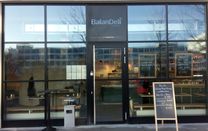
If you happen to strand in the urban desert of office blocks between the tube stops of Karl-Preis-Platz and Sankt-Martin-Straße head for the Neue Balan campus, a former industrial area where in the past Siemens produced semiconductors. Quite centrally you'll find Balan Deli, a modern yet comfortably furnished day cafe run as a not-for-profit company providing fair employment for an inclusive team of people with and without handicaps. The cafe was founded by the nearby inclusive Montessori school and designed by a Hamburg based artist. You can have a healthy lunch, partially based on organic ingredients, or simply an organic coffee, tea, wine or soft drink, often sourced from local producers, in a pleasant environment. The bread for the sandwiches comes from a local organic bakery. Unfortunately the service staff is not very knowledgeable (yet) about organic and sustainably produced food (when I enquired about the milk they told me it was organic although they actually use the cheaper conventional product of the Berchtesgadener Land dairy which also offers an extended range of organic dairy products), but was happy to ask the kitchen staff about the origin of the chicken in the Thai curry (which was not organic).
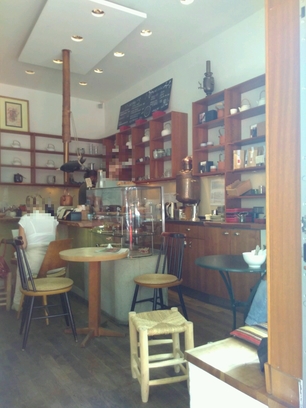
Tea houses
For those seriously into tea the ultimate target in town is Tushita Teehaus in the Glockenbach neighbourhood, near the Western exit of tube station Fraunhofer Straße (and a five minutes walk South of Gärtnerplatz). To taste their around 150 organic and often fairly traded tea and tisane varieties (which aren't exhaustively listed on the menu) can take some time, but you can buy them to take with you. With every order the staff will hold a microscopic tea ceremony for you, and hot water for a second extraction is served in a small thermos aside. In the past they often used too hot water for some of their delicate green teas resulting in a bitter beverage, but this fortunately had changed to the better at my last visit. In addition they serve small vegan dishes as well as yummy home-made cakes, all organic, and there's a Japanese touch to both, the decoration, the food and the subtle focus on Japanese tea and matcha. Consequently the place is frequented by visitors of Japanese origin as well as the occasional Indian gentleman or the German hippie or university professor reading their daily. Given how frequented the place often is there's a quiet, pleasantly concentrated atmosphere to it.
More to try
In the Westend, a few steps from Theresienwiese Café Gollier is a pleasant neighbourhood day cafe, popular for breakfast and hearty lunch. They promise to use regional, preferably organic products according to availability, but so far I have not had the chance to eat here.
Closed
The following places ceased to exist, although you still may find references to them on the web:
- Contains Coffee, Celibidacheforum
- Echt jetzt, Barer Str. 48 (web shop remaining)
- Emilo im Glockenbach, Buttermelcherstr. 5
- Emilo Westend, Gollierstr. 14
- Emilo am Odeonsplatz, Odeonspl. 14
- Emmi's Kitchen, Rosenheimer Str. 67 (vegetarian cafe cum eatery)
- Epique Raw, Max-Weber-Pl. 11 (vegan patisserie shop-in-shop)
- Fritz Brotbar, Nymphenburger Str. 154 (bakery cum cafe)
- Fritz Mühlenbäckerei, Müllerstr. 46 (cafe cum eatery, re-opened in 2020 as bread bar w/ show bakery)
- Himmelherrgott, Waldfriedhofstr. 105 (cafe)
- gROOSartig, Donnersbergerstr. 8
- Die Kaffee-Küche, Weißenburger Str. 6 (cafe)
- Kafehaus Karameel, Nymphenburger Str. 191 (Viennese-style coffee house)
- Kuko, Westendstr. 87 (unknown whether the successor, Fika, is organic)
- Lolas Eckcafé, Metzstr. 37
- Kaffee Sonnenschein, Gietlstr. 17
- MyMuesli München, Viktualienmarkt 7 (cereals shop cum cafe)
- MyMuesli München-Pasing w/in Pasing Arcaden, Josef-Felder-Str. 53 (muesli shop)
- MyMuesli München OEZ w/in Olympia-Einkaufszenrum, Hanauer Str. 68 (muesli shop)
- San Francisco Coffee Company, Nymphenburger Str. 151 (cafe)
- San Francisco Coffee Company, Innere Wiener Str. 57
- San Francisco Coffee Company Ostbahnhof, Orleanspl. 5a
- San Francisco Coffee Company Riem-Arcaden, Willy-Brandt-Pl. (cafe)
- San Francisco Coffee Company Maxvorstadt, Türkenstr. 47 (cafe)
- San Francisco Coffee Company Odeonsplatz, Theatinerstr. 23 (cafe)
- Black Bean, Amalienstr. 44 (cafe)
2025-03-06 11:30:00 [Munich, Au, Haidhausen, Maxvorstadt, Schwabing, Westend, Englischer_Garten, organic, coffee, tea, breakfast, lunch, snacks, fair, vegan, gluten_free, cafe, ice-cream, restaurant, American, Italian, Japanese] [direct link · table of contents]

